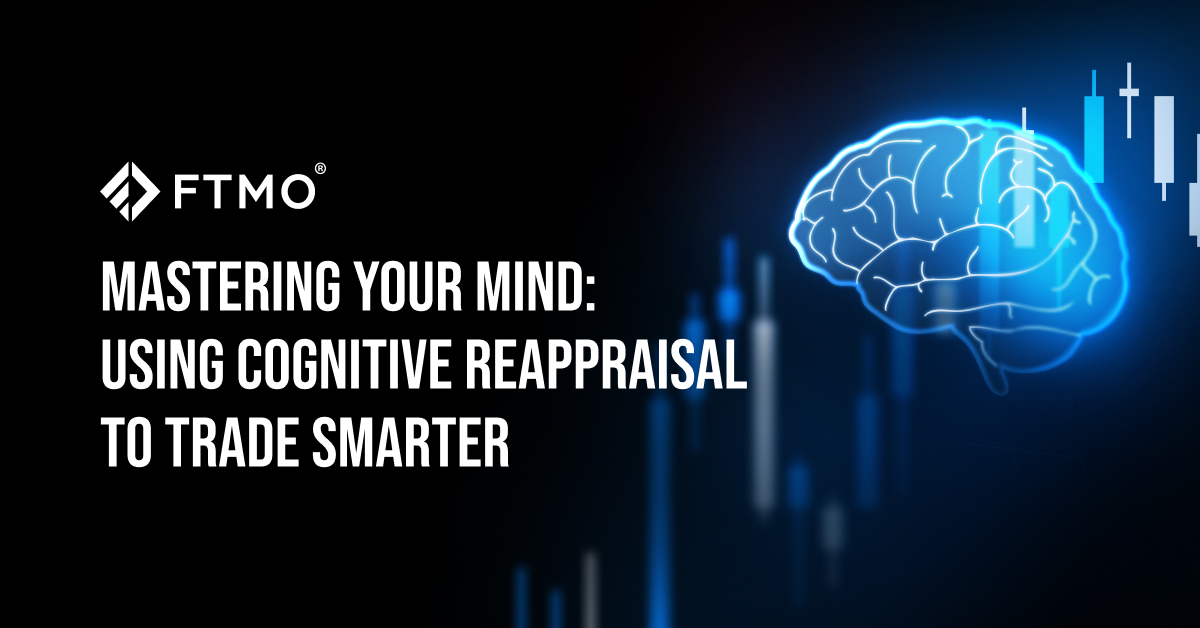
Mastering Your Mind: Using Cognitive Reappraisal to Trade Smarter
Trading challenges your mindset as much as your technical skills. The ups and downs, the uncertainty, the constant decision-making stirs up powerful emotions. The difference between an impulsive trader and a resilient one often comes down to emotional regulation which refers to the processes by which we influence which emotions we have, when we have them, and how we experience and express these emotions.
Emotional regulation in trading
Emotional regulation refers to the mental processes through which we manage, modify, and respond to emotional experiences. In trading, emotions like fear, greed, frustration, or overconfidence often arise spontaneously — but how we handle them makes the difference.
We regulate emotions in two main ways:
- • Down-regulating negative emotions such as anxiety, anger, or regret
- • Up-regulating positive emotions like confidence, motivation, or patience
These strategies aren’t about suppressing how you feel — rather, they help you respond intentionally, so emotions don’t override logic.
Cognitive reappraisal: Rethinking the Situation
Among the many strategies for emotional regulation, cognitive reappraisal is one of the most effective — especially in the fast-paced, high-stakes world of trading.
Cognitive reappraisal involves reinterpreting a situation in a way that changes its emotional impact. This means shifting your perspective so that an event no longer feels threatening, frustrating, or defeating, but rather manageable — or even constructive.
Instead of reacting emotionally to market events, reappraisal helps you respond with clarity and control.
This isn’t about ignoring reality or “thinking positively” in an artificial way. It’s about choosing a more helpful narrative that supports your trading goals and protects your psychological capital.
How reframing can shift your mindset in trading situations
When you hit a Stop Loss. Your default reaction might be: “I failed. I should’ve seen this coming.”, but cognitive reappraisal might help you reduce frustration and help you stay focused on the next trade. You might shift the mindset to: “I followed my plan and protected my capital — exactly what I was supposed to do.”
When you miss a trade or a big move. Your default thought might be: “I can’t believe I missed that.” But instead, try to reframe the situation like this: “Opportunities are endless. I’ll focus on the next setup, not the one that got away.”
When you’re on a losing streak. You may say to yourself: “I’ve lost my touch. I should quit.” Instead, try to take it as a part of the process: “Every trader faces drawdowns. It’s a chance to review my plan and stay disciplined.”
Integrating Reappraisal into Your Trading Routine
Cognitive reappraisal is not a one-time fix, it’s a skill that improves with practice and reflection. Here’s how to develop it systematically.
- 1. Pause Before Reacting
When a strong emotion arises, take a brief pause and ask yourself:
- • Is this feeling helping or hurting my decision-making right now?
- • What’s another way to interpret this situation?
This pause helps create space between emotion and action.
- 2. Journal Emotional Triggers
After each trading session, reflect on moments of emotional intensity:
- • What triggered the emotional reaction?
- • What was your initial thought or reaction?
- • How could you have reappraised it?
This process increases self-awareness and builds emotional agility over time.
- 3. Reframe the Narrative
Try to rewrite the story you’re telling yourself:
- • From: “I made a dumb mistake.”
- • To: “I took a trade that didn’t work out. That happens — what can I learn from it?”
Reframing builds resilience and reduces destructive self-talk.
- 4. Assess Your Capacity to Cope
If you’re feeling overwhelmed, try to break down the perceived demands into smaller, manageable steps.
- • Focus on what you can control: position size, Stop Loss, trade selection.
- • Remind yourself of previous challenges you’ve overcome.
This restores a sense of agency and perspective.
- 5. Practice Regular Reflection
Review your trades weekly — not just for P&L, but for your mental performance:
- • When did you react emotionally?
- • How did you handle it?
- • What could you reframe differently next time?
The goal is to build habits of thought that support consistency.
The Benefits of Cognitive Reappraisal in Trading
Cognitive reappraisal won’t change what happens in the market, but it can radically change how you respond. By learning to reinterpret emotionally charged situations, you reduce reactivity, sharpen your focus, and bring more consistency to your decision-making. Over time, this strategy helps you stay calm under pressure, handle drawdowns with resilience, and avoid the traps of impulsive trading. Ultimately, it’s not just your strategy that determines your success — it’s your ability to manage your internal environment. You don’t need to control the market. You need to control your mind. And reappraisal is one of the most powerful tools to help you do just that.
About FTMO
FTMO developed a 2-step Evaluation Process to find trading talents. Upon successful completion you can get an FTMO Account with a balance of up to $200,000. How does it work?.










